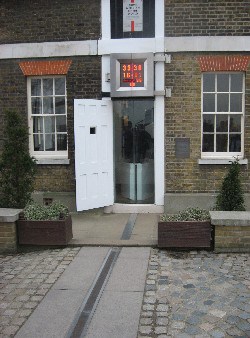
Greenwich Meridian – longitude zero since 1851
Last night, the Royal Observatory at Greenwich became a melting pot of science and journalism as it played host to the UK media launch of the International Year of Astronomy.
Key speakers included cosmologist and Royal Society President, Martin Rees; Observatory Director, Kevin Fewster, and the UK Chair of IYA2009, Ian Robson.
I arrived in early, while it was still daylight, to get the obligatory snap of me straddling the Greenwich Meridian, the prime meridian of the World (Longitude 0º) since the late 19th Century.
Highlights of the evening included an impressive tour in and around the solar system via the Peter Harrison Planetarium – Europe’s first digital laser planetarium projector; a Q&A session with the Public Astronomer, Marek Kukula; and astronomically themed music performed by students from the neighbouring college of music.
Unfortunately, the planned live link up with the Liverpool Telescope – confusingly housed in the Canary Islands – didn’t quite work out. Apparently, humidity in the Spanish archipelago was at 90 % so nothing could be seen through the veil of mist.
Star of the show was undoubtedly Rees, who delivered a pitch perfect history of astronomy and its cultural force over the past 400 years since Galileo first pointed his telescope to the skies.
The nice thing about his speech was its optimism. So often, in these times of environmental and economic turmoil, keynote speeches by eminent scientists can be doom laden with very few flickers of hope. While Rees checked the climate change box, he didn’t pitch the need for Government action as an end in itself; he waxed lyrical on the incentives for protecting the planet, in particular the sense of awe inspired by astronomy and how this can put global issues in perspective. Referring to the campaign for “dark skies” he said:
“It’s not just astronomers who care about this, just as its not just keen ornithologists who would feel deprived if song-birds disappeared from our parks and gardens”.
One particularly notable project in the UK IYA2009 programme is the Telescopes for Schools project which will see 1000 UK schools receive a free telescope over the next year. Picking up the bill is a combination of the Society for Popular Astronomy, the Royal Astronomical Society and the UK science-research funding body STFC.
I caught up with the project leader Helen Walker of the Rutherford Appleton Laboratory and she told me she had been putting the finishing touches to the accompanying DVD over Christmas and the telescopes are ready to be rolled out to schools over the next few months:
“The kids should get some great views of the Moon, with plenty of crater detail and they can hopefully get some sightings Jupiter and Saturn. We’re hoping schools will include telescopes in science lessons but also set up after school clubs to get the great views the darkness will bring.”



